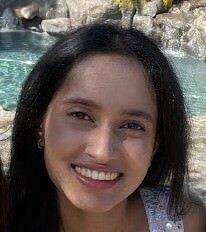Editor’s note: Maya is a pseudonym used to protect the identity of a student interviewed for this story.
Maya sighed in frustration as her mom, sister, aunt and cousin argued over Democratic nominee Joe Biden and incumbent Republican Donald Trump. What was originally supposed to be a lighthearted family reunion quickly became a heated political debate the day before Election Day.
Maya’s mom and cousin voted for Trump.
“They are very religious, so they don’t actively support the LGBTQ+ community or the legalization of gay marriage,” Maya said. “That’s the sole reason why they voted for Trump.”
On the other hand, Maya, her sister and her aunt saw Biden as the better candidate. Maya respected that her mom and cousin were religious but thinks that reason alone wasn’t enough to vote for Trump. As president, Trump has done “so many other questionable things,” she said, including passing the Muslim Travel Ban and putting children at the border in cages, not to mention his own alleged financial missdeeds such as tax fraud and evasion.
Although both Maya and her mother consider their political views to be moderate, Maya’s mother is in the camp of the 74 million Americans who voted for Trump.
This generation gap is not uncommon. A 2019 study by Pew Research Center revealed a positive correlation between age and satisfaction with the Trump presidency. Only 30 percent of Gen Z and 29 percent of millennials (those up to age 39) approve of Trump, compared to 43 percent of Baby Boomers (those 56 to 74 years old) and 54 percent of the Silent Generation (those 75 and above).
Senior Lisa George, who considers herself a progressive, said she has noticed a discrepancy between her family members’ comfort with talking about politics even though they agree on most issues.
George’s parents are slightly more moderate in their views.
“My parents and I have a lot of discussions about politics, much to my mom’s chagrin,” George said. “She thinks it’s kind of embarrassing that her children have very strong political views, which my sister and I think is pretty funny.”
In general, however, George has not faced much condemnation here for being liberal. She said she feels “extremely grateful” to live in California, one of the most liberal states.
The general political leanings at the school mirror those of the state. In a mock election poll conducted in all AP Gov/Econ classes, 170 students reported that they would have voted for Biden if given the chance, compared to 20 who said they would vote for Trump.
Senior Michael Burry was among those supporting the current president. For his part, he said he leans farther right than the rest of his family, though they agree on many issues.
Living in Santa Clara, a county that supported Biden by more than 400,000 votes, Burry said he has received heavy backlash for his opinions. He believes many of the social problems he faces stem from his liberal classmates and teachers.
“I definitely face a lot of hate from a lot of people who call me a racist, sexist, xenophobic, homophobic, Bible-thumping Nazi,” he said. “Liberals have no boundaries. They have no checks in a place like Silicon Valley. They are the accepted ‘right’ view.”
Burry believes that in Saratoga, political polarization is generally not a prominent issue because there are few vocal conservatives.
“Liberals can hate me and cancel me if they want because I represent such a small portion of our immediate community,” Burry said. “If I canceled liberals out of my life, I would have no friends.”
He suspects that the liberal nature of Saratoga has even pervaded the curriculum taught in school. For instance, in his AP Gov/Econ class, Burry finds that conservative values and economic ideals are “not given any credence.” Rather, classes discuss topics like gender identity, gender roles and Black empowerment, which he said are “not really educational”
Burry feels that his teachers project their own views onto their students.
“Everyone’s indoctrinated to be a progressive,” he said. George, however, finds the idea that the school’s curriculum is too liberal “wrong to a degree that is laughable.” She believes that if anything, the school curriculum lacks inclusivity and isn’t diverse enough.
In her sophomore year, George said she learned almost nothing about Asia, South America and Africa in her World History class. She felt that the focus of the course was centered on Europe and the World Wars, with a few morsels of Japanese imperialism.
Despite her slight dissatisfaction with the school’s curriculum, George said the Saratoga community is not very politically polarized — at least not on the surface.
“I do feel like there is a large number of ‘socially liberal, fiscally conservative’ people here,” George said. “Although Saratoga does not seem like it would be teeming with conservatives, I do think there is a decent number of closeted Trump supporters.”
Additionally, as an Indian American, George thinks one contributing factor to political polarization is that many Asian Americans and Indian Americans in Saratoga “subscribe to the idea of being the model minority,” which she finds “ignorant.”
She said she has observed that people are willing to ignore systemic racism in order to feel validated and accepted by the predominant racial group in America.
George has heard many Asian and Indian Americans saying the n-word at school and has both witnessed and heard of insensitive comments on social media. For example, one of George’s cousins opposes the Black Lives Matter movement because he believes “African Americans should just pull themselves up by their bootstraps like everyone else did.”
While George thinks Republicans and Democrats can get along and even be friends, she draws the line at mixing with Trump supporters.
“I think being a Trump supporter demonstrates a serious lapse in one’s judgment and a deep flaw in one’s moral character,” she said. “I truly don’t believe that someone can claim they are a good person if they support Trump, regardless of what their reasons are.”
Maya, who had political disagreements with her mom and cousin, said she thinks politics shouldn’t be a basis of friendships. She said people’s beliefs and where they stand on the political spectrum usually has to do with their experiences or identities, making it “extreme to cut people off.”
In the few weeks surrounding the election, Maya noticed some tension in her family relationships, but she only remained internally upset at some of her mom’s views on the LGBTQ+ community.
“Everyone’s entitled to their own opinions and values and I think everyone should respect others,” Maya said. “You don’t need to have the same values as other people, but there’s no need to attack Republicans or liberals and tell them whatever is wrong with their beliefs.”
Maya said a driving force behind the seemingly high proportion of liberals in Saratoga can be attributed to mob mentality and peer influence. She knows of people who claim to be Democrats just because they want to fit in.
Due to Saratoga’s predominantly liberal culture, Burry thinks there is no way to minimize polarization because “they can think whatever they want and always have the majority on their side.”
While contrasting political views can be a force of division in the country, the recent election did not have much of an impact on Burry’s relationships.
“If [my peers] don’t like me because I’m conservative, the election of Biden doesn’t change that,” Burry said. “I’m a guy that has respect for people with differing opinions, so I don’t have any contempt for my Biden-supporting friends.”
For her part, George believes polarization can be combated by having open, honest and civil discussions about politics.
“I am more than open to having a calm and fact-based conversation about politics with my peers,” said George. “I think most people feel the same way.”



























